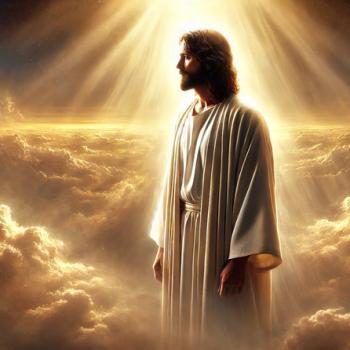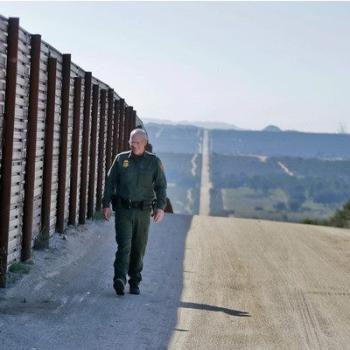OK, then, what about Hitler?
That's usually one of the first questions asked when one expresses a disbelief in the notion of Hell as a literal place of eternal, fiery torment. ("Literal" here referring to a literal interpretation of Dante's Inferno and more than a century of Hollywood movies and tent-meeting sermons.) I've even been asked that question after quoting Julian of Norwich:
"Yeah, well what about Hitler?"
And it's actually a good question. There are plenty of unseemly or even reprehensible reasons why someone might choose to believe in an eternal Hell, and we needn't spend much time on those. But there are also some better, more reasonable and nobler reasons. Such as the Hitler question.
That question is a way of stumbling toward the matter of ultimate justice. Hell, or something like Hell, seems necessary in a sense to satisfy our need to believe in ultimate justice. This is an actual thing, a real, measurable phenomenon that exists. Not the reality of ultimate justice itself, of course — that may be true but can't be measured or proved — but the reality of our desire for it.
That desire is a strange thing. We humans — many, maybe even most of us — seem to share two conclusions about the world in which we live: 1) It's not fair; and 2) It ought to be fair. There's a universe of evidence for the first conclusion there, which only makes the second notion that much stranger.
The belief that what is is not the same as what ought to be is a curious thing. It's not as though we had some counter-example to our own existence with which to compare this reality, so we could say, "Look over there at that world, where life is fair. I prefer that to this." Yet somehow we seem to feel that this hypothetical reality of a just world is more valid, more real, than the actual reality of the actual world and its relentless stream of reminders that justice is exceptional, rare and contrary to what actually is.
In Mere Christianity, C.S. Lewis pounces on this odd notion. If life is unfair, he argues, then where on earth did we get the idea of the categories of fair and unfair? Nowhere on earth, it would seem. He works at this until he's convinced it's a kind of proof of something transcendent. I think that overstates the case. Lewis' argument doesn't offer proof, or even evidence, but it may provide a kind of … inkling (sorry).
Lewis is right, though, that this idea of some kind of ultimate justice is the stuff of religion. All religion.*
Consider again that parable Jesus told about the beggar Lazarus and the callous rich man. That parable describes a common phenomenon, almost a microcosm of this unfair, unjust world. The actual, real world we live in is filled with precisely this sort of situation. Lazarus' life was an unending stream of misery — cold, hunger, physical pain, neglect and loneliness. The self-centered rich man, on the other hand, had the best food, the best house, the finest clothes and all the friends money could buy. And he didn't give a rip about Lazarus.
That doesn't seem fair. It isn't fair. We want to see such unfairness corrected. The world seems wrong and we want to see it made or remade right.
Every religion worth anything addresses this dilemma in two ways. First by requiring that its adherents practice both charity and justice here in this life. And second by extending the hope that such unfairness will ultimately be rectified, if not in this world, then in the next.**
The main concern of this eschatological hope for ultimate justice tends to focus on Lazarus and the injustices suffered by those like him. We want to believe that there will be something better for them than the vicious, miserable, unbearable fate they have been dealt here on earth. But we also think of the injustice perpetrated by the rich man in the story. He got away with it in the short term, but ultimately we want to believe that he and people like him will have to account for their self-centered cruelty, otherwise it would seem that existence is ultimately unfair — that it will never be as just as it ought to be. So we want to see ultimate justice for both Lazarus and the rich man.
But note that ultimate justice is not the same thing as perfect or absolute justice. Thoughts of absolute justice tend to lead to the realization that, uh-oh, I'm probably not Lazarus in that story. I'm probably, at least sometimes, the other guy.
"Life is never fair," Oscar Wilde noted in An Ideal Husband, "And perhaps it is a good thing for most of us that it is not." That's an echo of an earlier playwright: "God's bodkin man, much better, use every man after his desert and who shall scape whipping?"
We hope for more justice than this world affords, but at the same time we hope for mercy to triumph over justice. Lazarus deserved better, but we don't necessarily want to "use every man after his desert."
So not perfect, absolute justice, then, but ultimate justice tempered by mercy.
Surely, though, there must be limits to this mercy. It's one thing for your or me or the rich man to be cut a bit of slack for our myopic self-absorption, but what about those driven by cruelty and evil to create Hell on earth? What about the mass-murderers and torturers, tyrants and oppressors?
Or, in other words, what about Hitler?
Whatever miserable end befalls a Hitler or an Amin or Stalin or Saddam Hussein in this world it still seems, somehow, inadequate. Those responsible for the suffering and death of millions can only suffer and die once themselves, and this seems disproportionate. It seems unfair. It is unfair.
For that unfairness, that injustice, to be addressed or redressed, it seems there needs to be some further accounting for such evils. Hell, or something like it, seems necessary then for the Hitlers of this world.
It's quite a leap, though — and a baseless, insupportable one — to jump from believing that ultimate justice requires some kind of accounting for evil to deciding that the precise form of that accounting must conform to the details of the fiery, eternal torment imagined by Dante and Hieronymus Bosch and Jack Chick and a thousand other (extracanonical) sources.
It's probably helpful, then, to distinguish two separate questions implicit in the cries of "What about Hitler?"
The first question is something like, "Do you believe that there will be some kind of ultimate accountability for evil?"
My answer to that question is yes. I believe there will be. I can't prove this, mind you, but I believe it. And this assertion — that the arc of the universe is long, but it bends toward justice — can be defended and supported by that Bible we evangelical Christian types put so much emphasis on. The same defense and support cannot be found for the sordidly detailed idea of a sulfurous netherworld to which all non-RTCs will be consigned for eternity.***
The second question is trickier, something more like, "What, exactly, happens to someone like Hitler after he dies?"
That is, to borrow the president's rough paraphrase of the Book of Job, a question above my pay grade. To ask that question is to ask, in the words of the play cited above, about the "undiscovered country from whose bourn / No traveller returns." In other words, I don't know. And anybody who says he does know shouldn't be trusted.
In that same story about Lazarus and the rich man, Abraham appears to say that we don't need some traveller to ret
urn from that undiscovered country — that Moses and the
Prophets tell us all we need to know. Moses and the prophets have a great deal to say about justice — both the best approximation of justice we can have in this world and of the promise of a greater, ultimate justice to come — but if they had anything to say about Hell they kept it to themselves.
– – – – – – – – – – – –
* Although not exclusively of religion. When the late Carl Sagan helped to create the National Religious Partnership on the Environment, he said he wanted to work with religious groups because we were the "ought people," whereas he, as a scientist, wasn't concerned with ought, only with is. That struck me as intriguing, but Sagan's own actions belied the distinction. He wasn't enlisting the support of religious groups out of some arbitrary personal preference, but because he thought we humans ought to be taking better care of our environment than we were.
** When religion goes awry or becomes corrupt, it often results from or results in an emphasis on one of those two aspects to the neglect of the other. Corruption A: Emphasize the hope for eschatological justice to the neglect of justice in this world and you end up with the "pie in the sky when you die" opiate used to justify every oppressive caste system from Bombay to Alabama. Corruption B: Emphasize justice in this world to the neglect of the hope for eschatological justice and you begin thinking that you can impose perfect, infallible justice here in the temporal realm — an idea that quickly gallops off into oppressive theocracy of one form or another.
Our history books and newspapers are so full of examples of both of those errors that it can be tempting to think that maybe religion itself is the problem. If we could just stamp out religion, we could end oppression and establish perfect justice. See again Corruption B above.
*** The eternal aspect of this idea of Hell is also troublesome. Part of the trouble here, as ever when we talk of "eternity," is that we tend to think of it in terms of "forever" or "a very long time" — roughly the same mistake as thinking of "infinity" as meaning "a really big number." But it's also the case, as many have argued, that it seems unfair and unjust that temporal, finite wrongdoing would be consigned to an eternal, infinite punishment.
Then again, the idea of Heaven as eternal and infinite reward raises a similar question of proportionality, but you don't hear that raised as an objection. Stinginess offends justice; magnanimity does not. I wrote above that there must surely be some limits to mercy, but I'm not really sure that's true. If God is worthy of being called God, then God's mercy must be infinitely greater than my own.
















